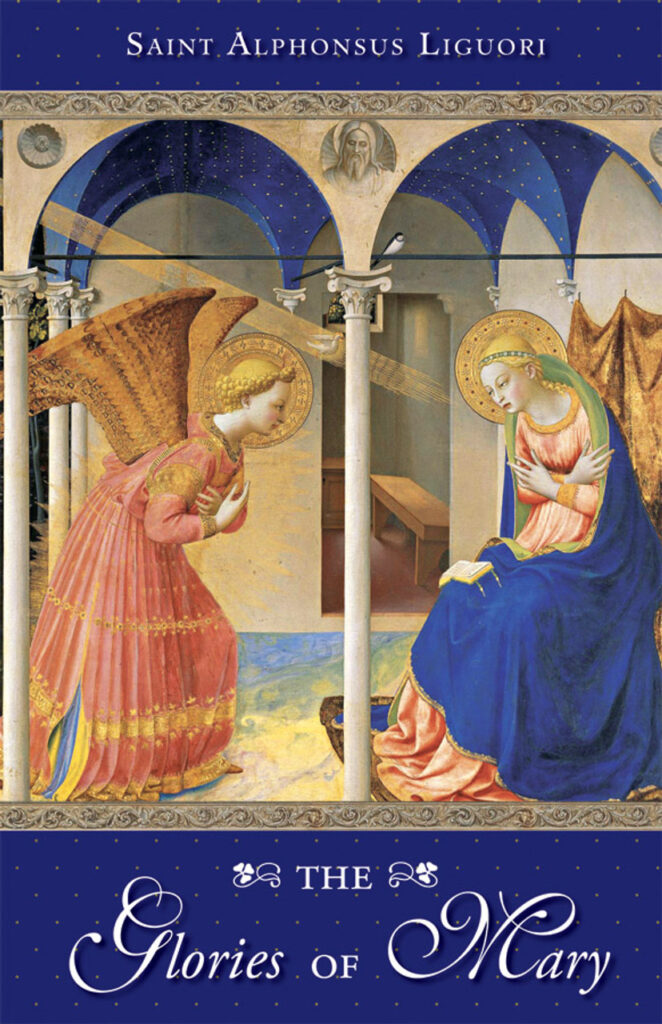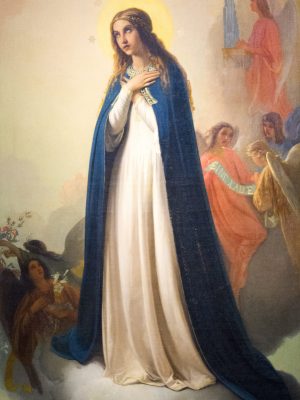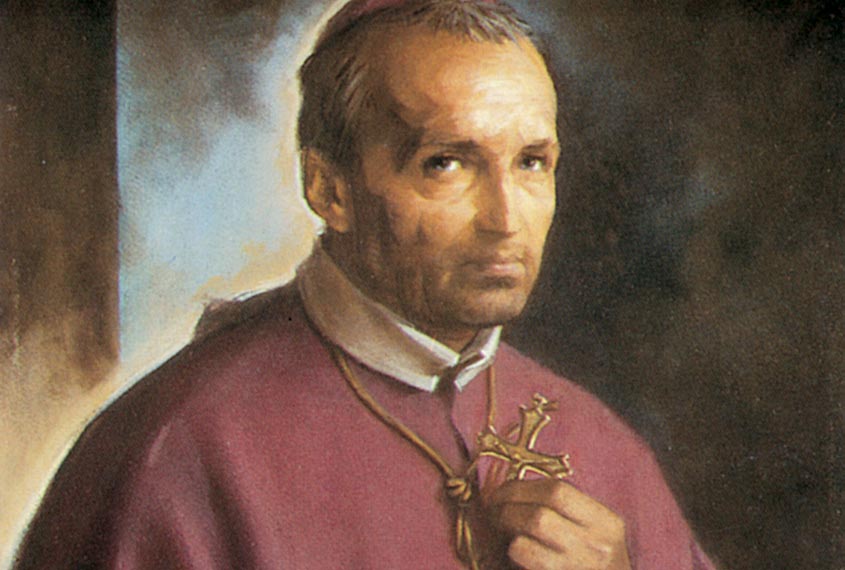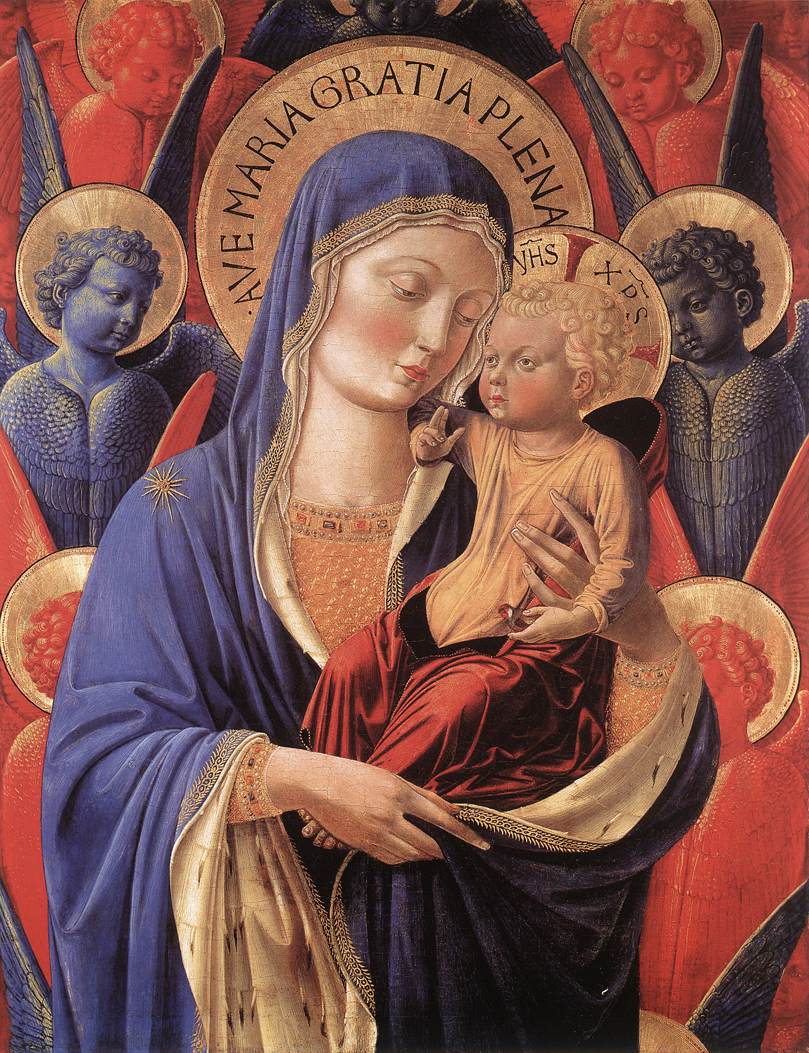OUR HOPE
Modern heretics cannot endure that we should salute and call Mary our Hope: ‘Hail, our Hope!’ They say that God alone is our hope; and that He curses those who put their trust in creatures in these words of the prophet Jeremias: “Cursed be the man that trusteth in man.”
Mary, they exclaim, is a creature; and how can a creature be our hope? This is what the heretics say; but in spite of it, the holy Church obliges all ecclesiastics and religious each day to raise their voices, and in the name of all the faithful, invoke and call Mary by the sweet name of ‘our Hope,’—the Hope of all.
The angelic Doctor Saint Thomas says, that we can place our hope in a person in two ways: as a principal cause, and as a mediate one. Those who hope for a favour from a king, hope it from him as lord; they hope for it from his minister or favourite as an intercessor. If the favour is granted, it comes primarily from the king, but it comes through the instrumentality of the favourite; and in this case he who seeks the favour is right in calling his intercessor his hope.
The King of Heaven, being infinite goodness, desires in the highest degree to enrich us with His graces; but, because confidence is requisite on our part, and in order to increase it in us, He has given us His own Mother to be our Mother and Advocate, and to her He has given all power to help us; and therefore He wills that we should repose our hope of salvation and of every blessing in her.
Those who place their hopes in creatures alone, independently of God, as sinners do, and in order to obtain the friendship and favour of a man, fear not to outrage His Divine Majesty, are most certainly cursed by God, as the prophet Jeremias says. But those who hope in Mary, as Mother of God, who is able to obtain graces and eternal life for them, are truly blessed and acceptable to the heart of God, who desires to see that greatest of His creatures honoured; for she loved and honoured Him in this world more than all men and angels put together.
And therefore we justly and reasonably call the Blessed Virgin our Hope, trusting, as Cardinal Bellarmin says, ‘that we shall obtain, through her intercession, that which we should not obtain by our own unaided prayers.’ ‘We pray to her,’ says the learned Suarez, ‘in order that the dignity of the intercessor may supply for our own unworthiness; so that,’ he continues, ‘to implore the Blessed Virgin in such a spirit, is not diffidence in the mercy of God, but fear of our own unworthiness.’
It is, then, not without reason that the holy Church, in the words of Ecclesiasticus, calls Mary “the Mother of holy Hope.” She is the mother who gives birth to holy hope in our hearts; not to the hope of the vain and transitory goods of this life, but of the immense and eternal goods of heaven. ‘Hail, then, O hope of my soul!’ exclaims St. Ephrem, addressing this Divine Mother; ‘hail, O certain salvation of Christians; hail, O helper of sinners; hail, fortress of the faithful and salvation of the world!’ Other Saints remind us, that after God, our only Hope is Mary; and, therefore, they call her, ‘after God, their only Hope.’ And St. Ephrem, reflecting on the present order of providence, by which God wills (as St. Bernard says, and as we shall prove at length) that all who are saved should be saved by the means of Mary, thus addresses her: ‘O Lady, cease not to watch over us; preserve and guard us under the wings of thy compassion and mercy, for, after God, we have no hope but in thee.’
St. Thomas of Villanova repeats the same thing, calling her ‘our only refuge, help, and asylum.’ St. Bernard seems to give the reason for this when he says, ‘See, O man, the designs of God,—designs by which He is able to dispense His mercy more abundantly to us; for, desiring to redeem the whole human race, He has placed the whole price of redemption in the hands of Mary, that she may dispense it at will.’ In the book of Exodus we read that God commanded Moses to make a mercy-seat of the purest gold, because it was thence that He would speak to him. “Thou shalt make also a propitiatory of the purest gold . . . Thence will I give orders, and will speak to thee.” St. Andrew of Crete says, that ‘the whole world embraces Mary as being this propitiatory.’ And commenting on his words, a pious author exclaims, ‘Thou, O Mary, art the propitiatory of the whole world. From thee does our most compassionate Lord speak to our hearts; from thee He speaks words of pardon and mercy; from thee He bestows His gifts; from thee all good flows to us.’
And therefore, before the Divine Word took flesh in the womb of Mary, He sent an archangel to ask her consent: because He willed that the world should receive the Incarnate Word through her, and that she should be the source of every good. Hence St. Irenæus remarks, that as Eve was seduced, by a fallen angel, to flee from God, so Mary was led to receive God into her womb, obeying a good angel; and thus, by her obedience, repaired Eve’s disobedience, and became her advocate, and that of the whole human race. ‘If Eve disobeyed God, yet Mary was persuaded to obey God, that the Virgin Mary might become the advocate of the virgin Eve. And as the human race was bound to death through a virgin, it is saved through a Virgin.’
And B. Raymond Jordano also says, ‘that every good, every help, every grace that men have received and will receive from God until the end of time, came, and will come, to them by the intercession and through the hands of Mary.’ The devout Blosius, then, might well exclaim, ‘O Mary, O thou who art so loving and gracious towards all who love thee, tell me, who can be so infatuated and unfortunate as not to love thee?
Thou, in the midst of their doubts and difficulties, enlightenest the minds of all who, in their afflictions, have recourse to thee. Thou encouragest those who fly to thee in time of danger; thou succourest those who call upon thee; thou, after thy Divine Son, art the certain salvation of thy faithful servants. Hail, then, O hope of those who are in despair; O succour of those who are abandoned. O Mary, thou art all-powerful: for thy Divine Son, to honour thee, complies instantly with all thy desires.’
Saint Germanus, recognising in Mary the source of all our good, and that she delivers us from every evil, thus invokes her: ‘O, my sovereign Lady, delight of my soul, heavenly dew quenching my burning thirst, liquid flowing from God into my parched heart, bright light in the midst of my soul’s darkness, guide of my poor judgment, strength of my weakness, covering of my nudity, treasure of my poverty, remedy for incurable wounds, wiper away of tears, end of sighs, reverser of misfortunes, lightener of grief, loosener of my bonds, my hope of salvation, listen to my prayers, have mercy on my sighs, and reject not my lamentations; have mercy on me, and may my tears move thee; be moved by thine own feeling of compassion towards me, who art the Mother of God, the lover of men, hear and grant my prayers, fulfil my petition.’
We need not, then, be surprised that Saint Antoninus applies the following verse of the Book of Wisdom to Mary: “Now all good things came to me together with her.” For as this blessed Virgin is the Mother and dispenser of all good things, the whole world, and more particularly each individual who lives in it as a devout client of this great Queen, may say with truth, that with devotion to Mary, both he and the world have obtained everything good and perfect.
The Saint thus expresses his thought: ‘She is the Mother of all good things, and the world can truly say, that with her (that is, the most Blessed Virgin) it has received all good things.’ And hence the Blessed Abbot of Celles expressly declares, ‘that when we find Mary, we find all.’ Whoever finds Mary finds every good thing, obtains all graces and all virtues; for by her powerful intercession she obtains all that is necessary to enrich him with Divine grace.
This article is taken from a chapter in The Glories of Mary by St. Alphonsus Liguori which is available from TAN Books.









